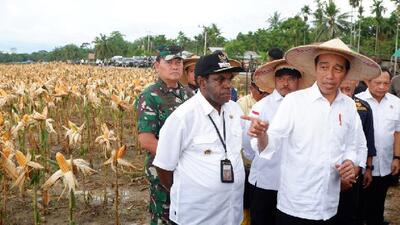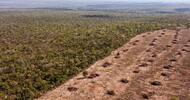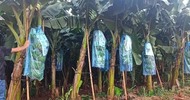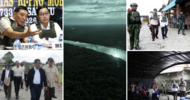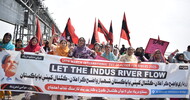National Strategic Food and Energy Development Project in Merauke potentially violates human rights and worsens the ecological crisis
Press Release of Yayasan Pusaka Bentala Rakyat and LBH Papua - Merauke Post
President Joko Widodo (Jokowi) performed the first sugar cane planting at the location of PT Global Papua Abadi, a sugar plantation company in Sermayam Village, Tanah Miring District, Merauke Regency, South Papua Province, on 23 July 2024. President Jokowi said that this activity is a strategic step in responding to the global food crisis triggered by extreme climate change.
Previously in November 2023, the Coordinating Minister for Economic Affairs, Airlangga Hartarto, made an addition to the list of National Strategic Projects in Papua, namely the Merauke Food and Energy Development Zone in South Papua Province through Regulation of the Coordinating Minister for Economic Affairs (Permenko) Number 8 of 2023 regarding Fourth Amendment to Permenko Number 7 of 2021 regarding Changes to the List of National Strategic Projects (PSN). Subsequently, President Joko Widodo issued Presidential Decree (Keppres) Number 15 of 2024 dated 19 April 2024 regarding Task Force (Satgas) for Accelerating Sugar and Bioethanol Self-Sufficiency in Merauke Regency, South Papua Province, in which Bahlil was appointed as Head of the Task Force.
The state's policies and support for the National Strategic Project (PSN) of Food and Energy Development is framed as a solution in the midst of a crisis. These are not the first discourse, solutions and policies of the state in Papua, previously, there were the Merauke Integrated Food and Energy Estate (MIFEE), Food Production Central Area (KSPPP), Papua Food Estate, and Merauke Special Economic Zone (KEK).
However, instead of shared prosperity, a great deal of new problems have emerged. Starting from the large scale transfer of land control of up to millions of hectares through fraudulent practices. As a result, indigenous peoples are excluded and lose control over land and forests which constitute the source of life, they face difficulty in accessing sources of food and sources of livelihood, destruction of social and cultural systems, exploitation of workers and inadequate wage, violence, non-compliance by the state and corporations in fulfilling the promises of prosperity and decent profit sharing, deforestation, malnutrition, destruction of the ecosystems where flora and fauna live, and even water pollution.
“We have documented the practice of land grabbing in the MIFEE program by way of granting business permits to corporations without the information and free consent of the indigenous peoples at large. There is an accumulation of wealth, concentration of control and ownership of land and forests in a handful of business entities and company groups. There are 38 companies with various businesses and commodities such as oil palm, sugar cane, corn, industrial forest plantations, which control land on a large scale of up to 1,588,651 hectares," said Franky Samperante, Director Yayasan Pusaka Bentala Rakyat.
Since 2010, the unpleasant experience, pain and suffering from the MIFEE program have not ceased and have continued to pile up. As told by Teddy Wakum, Head of LBH Papua - Merauke Post.
“To this day, the affected indigenous peoples are still complaining about the deviations and impacts of the MIFEE program. The Marind tribe and indigenous Papuan workers in Mam, Muting and Zanegi, are still demanding justice and restoration of the rights of the victims of violence, the company's promise of welfare and decent wage," said Teddy Wakum.
Since the project was launched and the arrival of President Jokowi, we have not found any information and documents on social studies and strategic environmental studies, which should have been carried out from the beginning before the commencement of the project. The government is also yet to provide information and obtain widespread approval from the indigenous peoples in the process and implementation of the National Strategic Project for the development of sugar, bioethanol and expansion of food estate, which will affect the indigenous peoples’ living systems and the ecosystems in customary areas.
The state's disregard for the rights of indigenous peoples in making the decisions is a violation of the principle of Free Prior Informed Consent (FPIC) as well as the laws and regulations, such as Law Number 21 of 2001 regarding Regional Autonomy of Papua Province, Article 43 on the Protection of the Rights of Indigenous Peoples.
We have also observed an increasing role of the Military and Police security apparatuses. Starting from the socialization process, negotiations in land acquisition, up to safeguarding and securing project operations equipment. This situation has made the people concerned, felt restricted and unfree to express their opinions and thoughts.
“We have heard complaints from the indigenous peoples. They have been pressured and were affected by the project, as stated by the Marind, Yeinan, Kimahima and Maklew indigenous peoples, they are the indigenous Papuans who inhabit most of the Merauke Regency area. We believe that this project has the potential of violating human rights, in relation to the indigenous peoples’ right to live, right to customary land and forests, right to free expression, right to freely determine the development which takes place in customary areas, right to food, right to intellectual property and knowledge, right to proper and healthy living environment," Teddy Wakum explained.
The government has been granting recommendations and business permits on a large scale to a handful of capital owners, as if Papua were an uninhabited land. In 2023 and 2024, the government has issued Space Utilization Activities Conformity Approvals (PKKPR) and Recommendation Letters to 9 (nine) sugar cane plantation companies, for an area of 469,147 hectares spread across Tanah Miring, Animha, Jagebob, Eligobel, Sota, Ulilin and Muting Districts, Merauke Regency. Furthermore, the media has just reported the presence of rich businessman, Andi Syamsuddin Arsyad a.k.a. Haji Isam, accompanied by the Deputy Minister of Defense (Wamenhan) Lt. Gen. TNI (Ret.) Muhammad Herindra at the Wanam port, Ilwayab District, Merauke Regency, unloading heavy excavators which are planned for use in the rice paddy creation program.
The nine companies are part of Global Papua Abadi (GPA) Group, and the beneficial owners are the Fangiono family, owner of First Resources and Ciliandry Anky Abadi Group, and Martua Sitorus, owner of Wilmar Group. GPA Group’s is planning investments for the development of sugar cane plantations and infrastructure in an area of 500,000 hectares and construction of 5 (five) sugar and bioethanol processing plants, with a total value of around Rp83 trillion.
Yayasan Pusaka Bentala Rakyat has conducted a rapid study on the aspect of utilization of forest areas and the environment from the permits and development of the sugar cane plantation industry, sugar and bioethanol factories, and it was discovered that most of the permits granted were in Convertible Production Forest Areas at 45 percent, Limited Production Forests at 30 percent, and the remaining 25 percent are Other Use Areas.
"The area of GPA Group’s sugar plantation licensing is located in a forest area and is in a permit moratorium area or Indicative Map for the Postponement of New Permits (PIPIB) by more than 30 percent or around 145,644 hectares, therefore, this project poses environmental risks, particularly of increasing greenhouse gas emissions, which cumulatively increases the ecological crisis. "In addition to that, most of the companies’ permits are in the customary area of the Yeinan customary law community of 316,711 hectares, and pose socioeconomic and cultural risks," said Franky Samperante.
We urge President Joko Widodo to consistently carry out the constitutional mandate to improve the people’s welfare and to seriously implement the commitment to improve natural resource governance which is fair and transparent, refrain from damaging the environment and causing climate change. Therefore, the President must stop the National Strategic Project of Food and Energy Development in Merauke, by taking the sociocultural, socioeconomic and environmental impacts into consideration and account.
We urge the corporations, investors and financial institutions to respect the rights of indigenous peoples to make decisions freely, and without forcing the communities to accept proposals and the companies' ventures to utilize and develop customary lands and forests in customary territories.
We also urge the regional governments to take effective and legal measures to respect and protect the existence and rights of indigenous peoples, the right to life, the right to free speech, the right to land, the right to food, the right to proper and healthy environment, the right to obtain public information, including on permits, as well as to meaningfully engage indigenous peoples in various development program plans.
Jakarta, 30 July 2024
Contact Person
Franky Samperante +62 811 1256 019
J. Teddy Wakum +62 822 4245 0431


